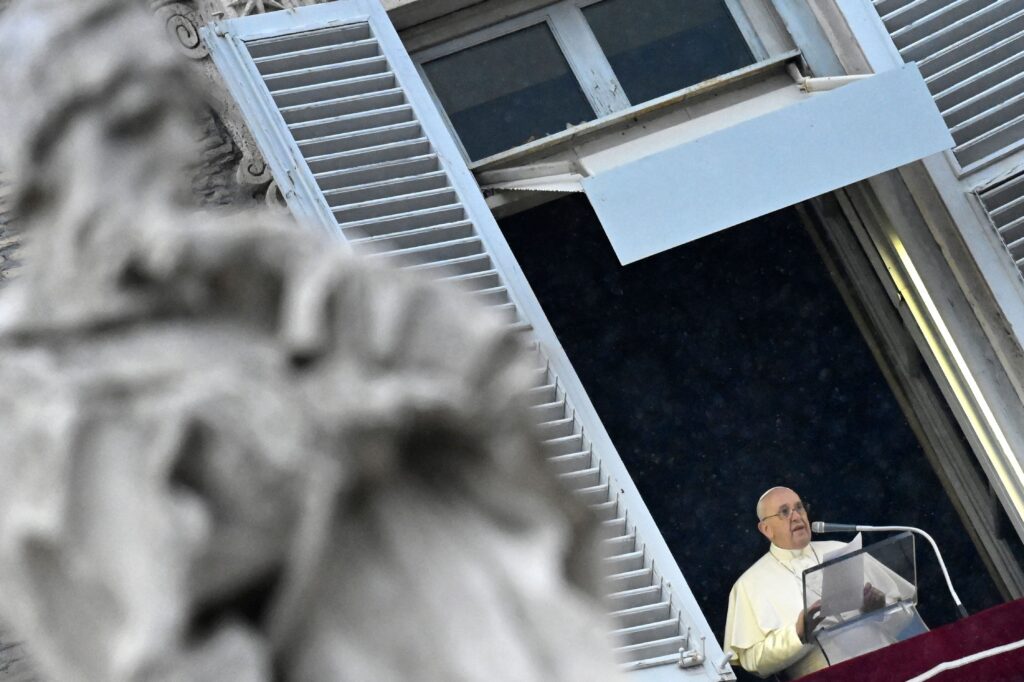Pope Francis hits out at ‘cancel culture’ and demotes archbishop who called same-sex unions ‘sin’

Pope Francis. (AlessVatican Pool/Getty Images)
Pope Francis condemned so-called “cancel culture” during his annual address to the Vatican’s Diplomatic Corps.
Speaking before diplomats from 183 countries accredited to the Holy See, and without a hint of irony, Pope Francis described cancel culture as “a form of ideological colonisation, one that leaves no room for freedom of expression,” Reuters reported.
“Cancel culture is invading many circles and public institutions,” the pontiff said on Monday (10 December) while describing the “crisis of trust” in multilateral diplomacy.
“As a result, agendas are increasingly dictated by a mindset that rejects the natural foundations of humanity and the cultural roots that constitute the identity of many people.”
Francis said that “under the guise of defending diversity, it ends up cancelling all sense of identity”.
This risks muffling voices that “defend a respectful and balanced understanding of various sensibilities”, he said, adding: “Diplomacy is called to be truly inclusive, not cancelling but cherishing the differences and sensibilities that have historically marked various peoples.”
The antidote to such ruptures, Francis added, is “reciprocal trust and willingness to dialogue” and the acceptance of “fundamental values”, such as “the right to life from conception to its natural end and the right to religious freedom”.
On the same day, the Pope demoted the archbishop reportedly responsible for the March 2021 document that stated the Church would not bless same-sex unions because God “cannot bless sin”, which sparked a fierce backlash.
Archbishop Giacomo Morandi was the “No. 2″ fo the Congregation for the Doctrine of the Faith. He will become bishop of the Italian diocese of Reggio Emilia-Guastalla, but will be allowed to retain the archbishop title “ad personam”.

Pope Francis addresses the crowd from the window of the apostolic palace. (ALBERTO PIZZOLI/AFP via Getty Images)
“Cancel culture” has become a popular refrain, often used in reference to public figures who are criticised for their viewpoints.
Often, the media is quick to declare a person cancelled when actually, they are simply being scrutinised or facing consequences for their actions.
While the implication of “being cancelled” is that a person is stripped of their platform, often those given the label continue to enjoy success and often, an increased profile as a result, raking in millions from books and films, appearing on TV and having theatres named after them.
“Religious freedoms“, meanwhile, are being used “with increasing frequency” by individuals and institutions to claim ” a right to discriminate — by refusing to provide services to women and LGBT people”, according to the ACLU.
It says that religious freedom means “we all have a right to our religious beliefs, but this does not give us the right to use our religion to discriminate against and impose those beliefs on others who do not share them”.
Donald Trump’s administration showed particular fervour for placing religious freedoms above all others. The Vatican once denied his secretary of state Mike Pompeo an audience, condemning his use of “religious freedom” for political gain.
There are concerns in the UK about the direction of travel when it comes to religious freedom. There has been much discussion around the governmennt’s pledge to “uphold religious freedom” within its proposed conversion therapy ban, for example.
The Vatican under Pope Francis’ leadership has been inconsistent in its approach to LGBT+ Catholics.
While Francis has insisted that sexual sins are “most the most serious“, in March, the Vatican’s Congregation for the Doctrine of the Faith said the Catholic Church cannot bless same-sex unions because God “does not and cannot bless sin“.
Francis strengthened the church’s opposition to marriage equality later that year, saying that “marriage is a sacrament” and cannot be changed.

